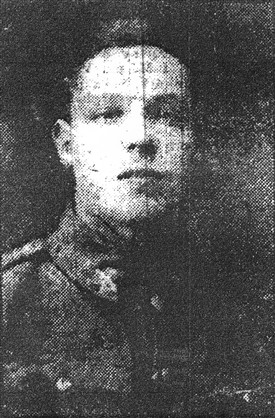TURNER, Joseph Ernest [of Newark]

Joseph Ernest Turner
Newark Herald Newspaper
211598 Sherwood Foresters / 43023 11th Btn. Leicestershire Regiment
By John Pownall
Through researching my family history, I discovered that Joseph Ernest Turner was my Father’s cousin. I found out that his mother’s name was Emily Ada Pownall. Emily married Mr George Walter Turner. The 1901 census evidenced that they were born and lived in Nottingham. The census indicated that the Turners were related to my family. My grandfather’s name was Samuel Pownall and his younger brother was called Arthur. Samuel and Arthur are stated as brothers-in-law to the Turners. The 1901 census also indicated that they were lodging with the Tuner family.
In the following 1911 census the Turners were stated as living at 11 Tenter buildings on Appleton Gate, Newark on Trent. The census also indicated that my grandfather was now married and living with his own family in Nottingham. In this census, Joseph is stated as being a Lather boy (Barber). His father’s occupation is stated as a boiler maker. Displayed on old maps of the time, a Boiler Manufacturer is shown to have been located near to the area where they lived. This was not far from Newark North Gate railway station where Joseph’s father may have been employed.
I obtained the following detail (also photo) from the archive of the Newark Herald newspaper, stated as written;-
“CORPL. J. E. TURNER, NEWARK.
Mr and Mrs. Turner, who up to six months ago resided in Tenter buildings and now live at Nottingham, have received news of the death in action of their only son, Corpl. J. E. Turner, of the Leicesters. Before joining up in the early days of the war, was apprenticed to Mr Newbold, hairdresser, Northgate. The first intimation the parents received was from the Corporal’s cousin, who said he saw him killed. Later the following letter was received from his C.Q.M.S, “I am writing on behalf of the N.C.O.’s of “C” Company to offer you our sympathy in the loss of your son. During the past two years we have been together we have always found him to be one of the best – a true British soldier. He was always willing to do any task he was asked and he did not know the meaning of fear. It may be of some consolation for you to know that your son died fighting and several of the enemy fell to his gun”.
Joseph Ernest Turner was first enlisted to the Sherwood Foresters (Nr 21159) and was transferred to the 11th Battalion the Leicestershire Regiment (Nr 43023).
His death is recorded as 22 March 1918 in Flanders, France. Joseph’s name is recorded on both the Arras Memorial and the Newark Memorial.